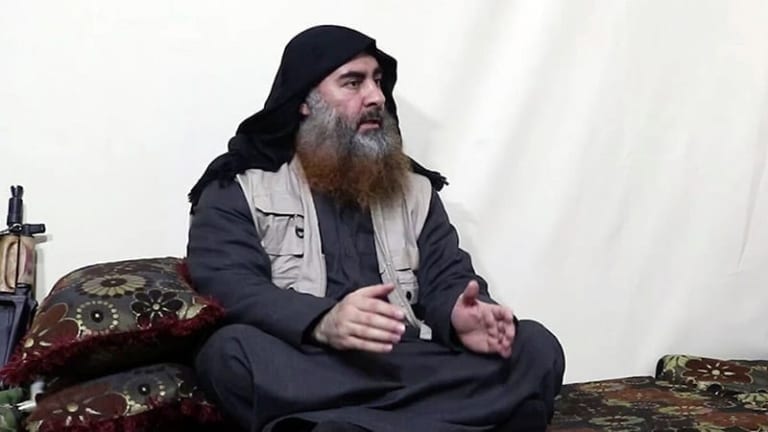
In a rare Sunday morning press conference on October 27, 2019, President Donald J. Trump announced the death of Abu Bakr al-Baghdadi, leader of the so-called Islamic State (IS), in a US military operation by special forces the previous night. Baghdadi, the elusive founder of the “Islamic caliphate” in Iraq and Syria, was apparently cornered by US troops in a “safe house” located in the small village of Barisha in Idlib province in northwestern Syria. The IS leader reportedly took his own life by exploding a suicide vest he was wearing, killing himself and three of his children who accompanied him.
The announcement made by President Trump from the East Room of the White House was meant to brief the American people and the world community about the demise of the most hunted terrorist in the world and to give credit to the US special forces and intelligence agencies that planned and executed the raid. News analysts speculated that the president would give the usual basic and sanitized detail about the operation, discuss its symbolic value in the context of the ongoing global war on terror, and claim some credit for his administration in keeping its commitment to eliminate the scourge of terrorism.
In the first few minutes of his press conference, Trump covered basic details about the raid. Unsurprisingly, however, he gradually drifted from the script into a 45-minute rambling presentation that essentially transformed the solemn occasion into a reality show starring Donald Trump. The US president missed what could have been a unifying opportunity to mobilize the American public—indeed, the world community at large—against the depravity preached and practiced by Baghdadi and his remaining comrades-in-arms. It is difficult for someone like Trump to resist taking a victory lap after the successful raid; however, through acts of omission and commission, the president failed to show political leadership and skill at this rare historical moment.
First and foremost, the demise of Abu Bakr al-Baghdadi does represent a significant symbolic victory in the battle against terrorism in general, and the Islamic State, in particular. His departure from the scene is a welcome development from the perspective of his countless victims, whether American, European, Arab, Kurd, Christian, Jewish, Muslim, Yezidi, or otherwise. The 48-year-old self-declared caliph has left a legacy of heinous brutality, destruction, and savagery, primarily against fellow Muslims. The Middle East, and the whole world, are better off this week without the depraved mindset that produced IS. In the words of The Intercept’s Mehdi Hasan, “Good riddance to Abu Bakr al-Baghdadi.”
Second, in putting Trump’s announcement of Baghdadi’s death in perspective, it is vital to remember that the US raid killed a brutal and vicious terrorist; however, this attack did not end terrorism in the region. Many commentators, particularly those with a military background, emphasized that the IS leader is gone, but the group’s ideology survives. It might be broken and bleeding but IS definitely is not gone. In reality, the security situation in Syria and Iraq remains quite complicated and vulnerable despite Baghdadi’s death. As Brett McGurk told The New Yorker, “Baghdadi is significant because he declared himself the caliph and the head of a caliphate that was a rallying cry for tens of thousands of extremists around the world. That will be hard to replace.” At the same time, according to McGurk, “it does not end the threat of ISIS, of course.”
Third, the failure by President Trump to brief leaders of Congress, particularly the bipartisan “Gang of Eight,” about the operation might not be necessarily illegal, but it does violate a long-held practice in Washington regarding similar national security action by the administration. Trump justified his decision not to brief House Speaker Nancy Pelosi (D-California), Senate Minority Leader Chuck Schumer (D-New York), and Intelligence Committee Chairman Adam Schiff (D-California), among others, for fear of potential leaks that could jeopardize the safety of US troops. Yet, once he departed from his written script, the president revealed more operational details about the raid than any potential leak by Congress would have done. By excluding Congress from his decision regarding the operation, Trump downplayed the significance of bipartisan support traditionally pursued in national security issues like counterterrorism.
Finally, Trump’s choice of diplomatic language is not considered this administration’s forte. He is often abrupt, bellicose, inarticulate, and unconventional. Those skills were on display this past weekend. The president declared that Baghdadi “died like a dog, he died like a coward. He was whimpering, screaming and crying.” The president’s crude words might play to his advantage in red districts or states around the country, but they might come back to haunt the country in the future by the backlash they are likely to produce. In addition, as awful and horrible a man Baghdadi was, it behooves policy-makers to ask how such a “coward” and a “loser” like him was able to elude and keep the “civilized” world, including the United States, at bay since 2006, and particularly during the last five years.

